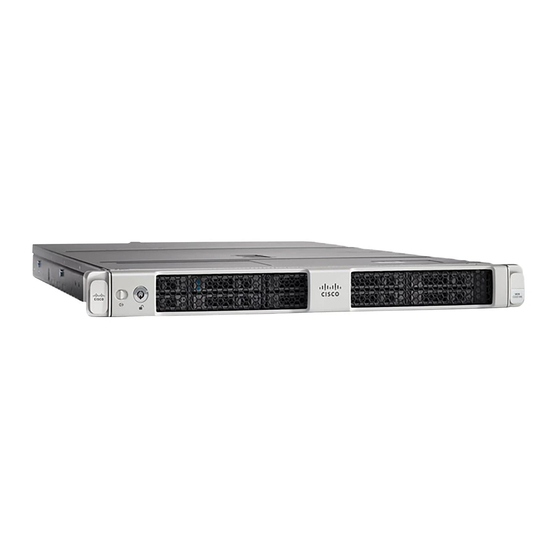Cisco SNS 3755 Instrukcja instalacji sprzętu - Strona 31
Przeglądaj online lub pobierz pdf Instrukcja instalacji sprzętu dla Sprzęt sieciowy Cisco SNS 3755. Cisco SNS 3755 42 stron.

Installing the Appliance
• Shared LOM EXT (default): This is the shared LOM extended mode, the factory-default setting. With this mode,
the Shared LOM and Cisco Card interfaces are both enabled. If you select this option, you must select the default
Active-Active NIC redundancy setting in the following step.
• Shared LOM: The 1-Gb/10-Gb Ethernet ports are used to access Cisco IMC. If you select this option, you must
select Active-Active or Active-standby NIC redundancy setting in the following step.
• Dedicated: The dedicated management port is used to access Cisco IMC. If you select this option, you must select
the None NIC redundancy setting in the following step.
• Cisco Card: The Virtual Interface Card (VIC) ports are used to access the Cisco IMC. If you select this option,
you must select Active-Active or Active-standby NIC redundancy setting in the following step.
• VIC Slot: Only if you use the Cisco Card NIC mode, you must select this setting to match where your VIC is
installed. You can select Riser1, Riser2, or Flex-LOM (the mLOM slot).
• If you select Riser1, you must install the VIC in slot 1.
• If you select Riser2, you must install the VIC in slot 2.
• If you select Flex-LOM, you must install an mLOM-style VIC in the mLOM slot.
Step 2
Choose one of the following options for NIC redundancy:
• None: The Ethernet ports operate independently and do not fail over if there is a problem. This setting can be used
only with the Dedicated NIC mode.
• Active-standby: If an active Ethernet port fails, traffic fails over to a standby port. Shared LOM and Cisco Card
modes can use Active-standby or Active-active settings.
• Active-active (default): All Ethernet ports are utilized simultaneously. You must use only this NIC redundancy
setting if you have selected the Shared LOM EXT mode. Shared LOM and Cisco Card modes can use Active-standby
or Active-active settings.
Step 3
Choose whether to enable DHCP for dynamic network settings, or to enter static network settings.
Note
Before you enable DHCP, you must preconfigure your DHCP server with the range of MAC addresses
for this server. The MAC address is printed on a label on the rear of the server. This server has a range of
six MAC addresses assigned to Cisco IMC. The MAC address printed on the label is the beginning of the
range of six contiguous MAC addresses.
The Static IPv4 and IPv6 Settings include the following:
• Cisco IMC IP address: For IPv6, valid values are 1 - 127.
• Gateway: For IPv6, if you do not know the gateway, you can set it as none by entering :: (two colons).
• Preferred DNS Server Address: For IPv6, you can set this as none by entering :: (two colons).
Step 4
(Optional) Configure VLAN settings.
Step 5
(Optional) Set a hostname for the server.
Step 6
(Optional) Enable dynamic DNS and set a dynamic DNS (DDNS) domain.
Step 7
(Optional) If you check the Factory Default check box, the server reverts to the factory defaults.
Step 8
(Optional) Set a default user password.
Setting Up the System With the Cisco IMC Configuration Utility
Cisco Secure Network Server 3700 Series Appliance Hardware Installation Guide
27
